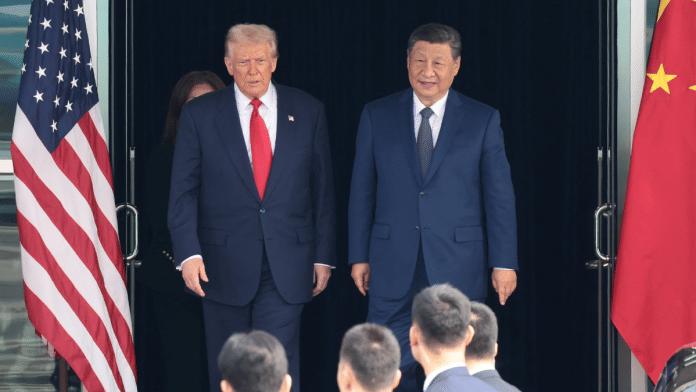New Delhi: The US and China have arrived at a ‘consensus’ on a number of issues including flow of rare earth elements, critical minerals and Beijing’s purchase of American agricultural products, potentially averting the worsening of the ongoing trade war between the two countries. The agreement was struck at a meeting between US President Donald J. Trump and Chinese President Xi Jinping in the South Korean city of Busan Thursday.
“I was extremely honoured by the fact that President Xi authorised China to begin the purchase of massive amounts of soybeans, sorghum, and other farm products … additionally, China has agreed to continue the flow of Rare Earth, Critical Minerals, Magnets, etc., openly and freely,” Trump said in a statement on Truth Social.
He added that China will defer its latest export controls on critical minerals by a year, while the two countries continue economic cooperation in other sectors such as energy.
The potential thaw in trade issues, especially exports of critical minerals and magnets, between the two largest economies, is bound to positively impact imports of such goods for other countries including India, which has been caught in the middle of the trade war.
“President Xi noted that the two teams had an in-depth exchange of views on important economic and trade issues, and reached consensus on solving various issues,” China’s Ministry of Foreign Affairs said.
Separately, Trump announced that he will cut in half the 20 percent tariff imposed on China to pressure Beijing to act against fentanyl entering the US illegally. This would reduce the effective tariffs on Chinese exports to around 47 percent from 57 percent, according to reports.
However, it should be noted that the agreement between the two leaders does not mean a deal has been reached. President Xi, in the Chinese readout, urged that two sides must ensure the “follow-up steps” as soon as possible.
The US and China have been negotiating a deal to ease differences in trade since Trump was re-elected in January. The two sides had arrived at various understandings earlier in the year, especially with regard to the export of critical minerals and rare earth elements. However, both sides have since moved to introduce more export controls, in the case of China, or threaten to impose new tariffs, as was the case with the US.
The Chinese Commerce Ministry made no mention of a one-year waiver on the earlier export restrictions announced by Beijing in April this year. However, the second round of export controls in October will be deferred by a year, according to The New York Times.
Also Read: India’s ‘triple anxiety’—What Chinese media sees in Jaishankar’s Beijing visit
Trump hints Beijing may swap Russian oil & gas for Alaska
Trump, after the meeting with Xi, also announced that China will be purchasing American energy soon. He added that a “large scale transaction may take place concerning the purchase of oil and gas from the Great State of Alaska”.
China has been the largest purchaser of Russian oil, especially since the Russia–Ukraine war broke out in 2022. The US has been pressuring countries like India and China to stop purchasing Russian oil. arguing that the proceeds power the Russian ‘war machine’.
Recently the US sanctioned two Russian oil firms including Rosneft and Lukoil. India has been a big purchaser of Russian oil in the last three years. A number of Indian companies have maintained contracts with Rosneft, which is now under scrutiny following the American sanctions.
China, on its part, has maintained a strong economic and defence partnership with Russia during the ongoing war. Chinese oil companies such as Yulong Petrochemicals are hoping to increase their purchase of Russian oil, in light of the US sanctions.
The Russia-Ukraine war did come up for discussion during the meeting in Busan, Trump said later. The US President has returned to Washington, D.C. concluding his six-day visit to Asia, where he participated at the ASEAN summit and related meetings in Kuala Lumpur.
The American president, in an interaction with the media following the meeting with Xi, also announced that the US will resume testing of nuclear weapons, though maintaining that the decision has nothing to do with China. Russia recently announced successful tests of a nuclear-powered cruise missile last week.
(Edited by Shashank Kishan)
Also Read: China will be more central to India now. Though an anti-US unity is premature






